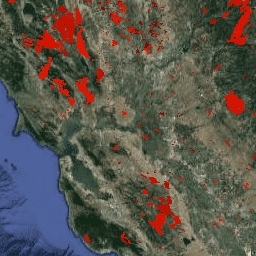Page Summary
-
The MCD64A1 Version 6.1 Burned Area data product provides monthly, global gridded 500m information on burned areas and quality.
-
This dataset, available from 2000-11-01 to 2025-08-01, uses MODIS Surface Reflectance and active fire observations to map burned areas.
-
The primary band,
BurnDate, indicates the approximate Julian day of burning or if a pixel is unburned, with other bands providing uncertainty and quality information. -
Data is available from NASA LP DAAC at the USGS EROS Center with no restrictions on use, sale, or redistribution.

- Dataset Availability
- 2000-11-01T00:00:00Z–2025-12-01T00:00:00Z
- Dataset Producer
- NASA LP DAAC at the USGS EROS Center
- Cadence
- 1 Month
- Tags
Description
The Terra and Aqua combined MCD64A1 Version 6.1 Burned Area data product is a monthly, global gridded 500m product containing per-pixel burned-area and quality information. The MCD64A1 burned-area mapping approach employs 500m MODIS Surface Reflectance imagery coupled with 1km MODIS active fire observations. The algorithm uses a burn sensitive vegetation index (VI) to create dynamic thresholds that are applied to the composite data. The VI is derived from MODIS shortwave infrared atmospherically corrected surface reflectance bands 5 and 7 with a measure of temporal texture. The algorithm identifies the date of burn for the 500m grid cells within each individual MODIS tile. The date is encoded in a single data layer as the ordinal day of the calendar year on which the burn occurred, with values assigned to unburned land pixels and additional special values reserved for missing data and water grid cells.
Documentation:
Bands
Pixel Size
500 meters
Bands
| Name | Min | Max | Pixel Size | Description | |||||||||||||||||||||||||||||||||||||||||||||||||||||||||||||||||||||||||||||||||||||||||||||||
|---|---|---|---|---|---|---|---|---|---|---|---|---|---|---|---|---|---|---|---|---|---|---|---|---|---|---|---|---|---|---|---|---|---|---|---|---|---|---|---|---|---|---|---|---|---|---|---|---|---|---|---|---|---|---|---|---|---|---|---|---|---|---|---|---|---|---|---|---|---|---|---|---|---|---|---|---|---|---|---|---|---|---|---|---|---|---|---|---|---|---|---|---|---|---|---|---|---|---|---|
BurnDate |
0 | 366 | meters | Burn day of year. Possible values: 0 (unburned), 1-366 (approximate Julian day of burning). |
|||||||||||||||||||||||||||||||||||||||||||||||||||||||||||||||||||||||||||||||||||||||||||||||
Uncertainty |
0 | 100 | meters | Estimated uncertainty in burn day |
|||||||||||||||||||||||||||||||||||||||||||||||||||||||||||||||||||||||||||||||||||||||||||||||
QA |
meters | Quality assurance indicators |
|||||||||||||||||||||||||||||||||||||||||||||||||||||||||||||||||||||||||||||||||||||||||||||||||
FirstDay |
0 | 366 | meters | First day of the year of reliable change detection |
|||||||||||||||||||||||||||||||||||||||||||||||||||||||||||||||||||||||||||||||||||||||||||||||
LastDay |
0 | 366 | meters | Last day of the year of reliable change detection |
|||||||||||||||||||||||||||||||||||||||||||||||||||||||||||||||||||||||||||||||||||||||||||||||
Terms of Use
Terms of Use
MODIS data and products acquired through the LP DAAC have no restrictions on subsequent use, sale, or redistribution.
Citations
Please visit LP DAAC 'Citing Our Data' page for information on citing LP DAAC datasets.
DOIs
Explore with Earth Engine
Code Editor (JavaScript)
var dataset = ee.ImageCollection('MODIS/061/MCD64A1') .filter(ee.Filter.date('2017-01-01', '2018-05-01')); var burnedArea = dataset.select('BurnDate'); var burnedAreaVis = { min: 30.0, max: 341.0, palette: ['4e0400', '951003', 'c61503', 'ff1901'], }; Map.setCenter(6.746, 46.529, 2); Map.addLayer(burnedArea, burnedAreaVis, 'Burned Area');